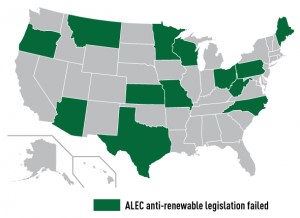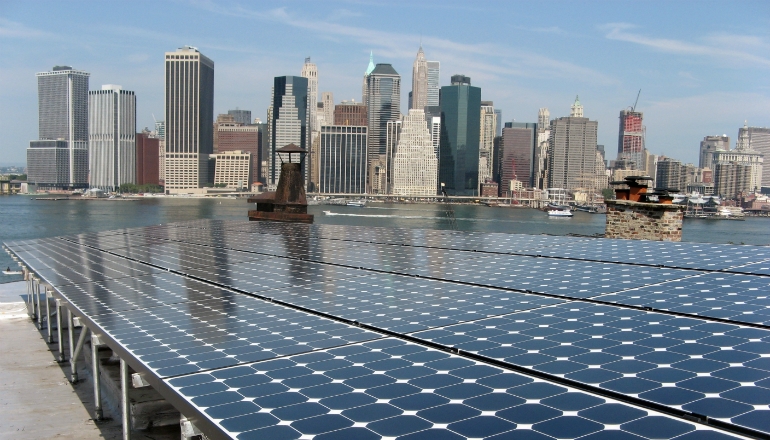
What the nuclear and fossil fuel industries have most in common is that they are “extractive” industries–their basic business is extracting energy sources from our earth (coal, uranium, oil, gas) and using that fuel to provide electricity and transportation–causing enormous radioactive, carbon, and other pollution.
What the clean energy industries have in common is that they extract nothing for their fuel; they use natural sources (wind, sun, water, heat from the earth) to provide electricity and, indirectly, transportation (e.g., electric cars, trains, etc.) and advanced technology to use energy as efficiently as possible and to more efficiently distribute electricity that is generated and needed.
Both sets of industries do, of course, require extraction of other elements for the construction of their technologies, but for the clean energy industries that pales in comparison to the nuclear/fossil fuels’ extraction of fuel sources.
Thus, it is easy to see why the nuclear and fossil fuel interests are natural allies, and why their common foe is the clean energy interests. Gains in clean energy–the newcomer–come at the expense of the old-line nuclear/fossil fuel industries. That’s why coal plants and atomic reactors have been closing, and clean energy deployment has been rising. The clean energy industries are also natural allies, and, at least should (but too often don’t in practice), have a common foe in the nuclear and fossil fuel industries.
Thus we get the joint–and in some cases coordinated–assault on clean energy from the nuclear and fossil fuel interests and their allies like the Koch Brothers, Americans for Prosperity, American Legislative Exchange Council, and now the utility trade group Edison Electric Institute (EEI), which admitted this week that its members are lobbying across the country for new taxes on solar power. That unprecedented step is the strongest indication yet that the utilities are scared to death of solar power–especially rooftop solar that they don’t control.
But the war against renewables is being waged on a lot of fronts, as we’ve reported on several times (for example here and here). The Energy and Policy Institute (to be honest, a group we know little about) has released a valuable new report (pdf) documenting both the state-by-state attacks on clean energy, current ones and those last year, as well as a fairly comprehensive examination of who is being those attacks. Make sure you check this out to see if your state is in the middle of one of these battles–and then take appropriate action (including contacting NIRS for mobilization help in contacting state legislatures).
The American Council on Renewable Energy (ACORE) also has been monitoring the assaults on state-level clean energy policies, and this week published their most recent analysis of the issue, focused on Kansas, Ohio, Colorado and North Carolina.
Both ACORE and the Energy and Policy Institute make the same mistake far too many in the climate movement make, and attribute all of the attacks on clean energy to fossil fuel interests. In fact, the nuclear industry is a strong ally with the fossil fuel industry in this war; thus you get Exelon attacking renewable energy Production Tax Credits; Arizona Public Service (not only a fossil fuel utility but operator of the nation’s largest nuclear complex at Palo Verde) going after rooftop solar, the Ohio utilities (also both fossil and nuclear-powered) trying to weaken renewable energy standards, etc. In fact, at the utility level, there is essentially no difference at all between the fossil fuel and nuclear industries. While there are a few utilities that use fossil fuels but have no nuclear, there are none that use nuclear and have no fossil fuels. It’s the same corporations, the same people, who are waging this war and they’re trying to protect both their fossil and nuclear assets.
But there is one place where there is a split among the dirty energy interests, and that’s on carbon. That split may be about to grow larger–but that’s not good news when it comes to nuclear power.
Those utilities most heavily reliant on nuclear power–think, for example, Exelon, Entergy, Duke, Dominion–have a stronger interest in protecting their reactors (and in the case of Southern Company and SCANA, reactors under construction) and thus supporting carbon reduction efforts, as long as they include nuclear power, than do those utilities more reliant on fossil fuels, especially coal. And, of course, the fossil fuel extraction industries, especially coal mining, don’t support carbon reduction of any kind.
That split will come to the fore in early June when the EPA intends to issue its proposed regulations limiting carbon emissions (and we learned today that President Obama is likely to make the regulation announcement himself, rather than leave it to the EPA Administrator, to indicate the Administration’s determination to get the proposal in place). The coal industry is already lining up to oppose the new rules, but the utility industry may be willing to support them, at least in part. And, while we don’t yet have documentation, the growing rumor mill is that one reason for the utility support is that the proposal will find a way to support nuclear power in a big way.
That coincides with what is really the nuclear industry’s only even moderately-compelling argument for its existence–it is a large-scale, low carbon (but not carbon-free) source of electricity. And to those (who include most of Washington’s political establishment from the White House on down, as well as most of the mainstream media) who haven’t examined the issue closely enough to understand that the reality of nuclear power is that it is actually counterproductive to effective climate action, that argument is unfortunately more than moderately-compelling.

That is the prime reason two major strategies for the nuclear industry are to influence the EPA’s clean air State Implementation Plans–which will be greatly affected by the new carbon rules–to support nuclear power and to push for including nuclear in state Renewable Energy Standards. Of course, if nuclear were included in the existing RES’, they would become meaningless–just about every nuclear state (and even some non-nuclear states if out-of-state-generation were included) would meet its existing RES standards without deploying a single new watt of clean energy.
The nuclear industry will continue to stress its ongoing mantra of “reliability,” energy “diversity,” and “baseload” power, as incoming Nuclear Energy Institute (NEI) President Chris Crane–the CEO of Exelon–made clear in a speech to NEI’s annual conference on Tuesday. But the industry seldom loses an opportunity to bring up climate as well, as Crane did on Tuesday, and we can expect that drumbeat to rev up as debate on the EPA’s carbon proposal becomes a public issue–as it will.
Crane’s appointment to NEI, by the way, illustrates the power of Exelon as the nation’s largest nuclear utility and as the setter of the agenda for the entire industry. Exelon already controls Nuclear Matters–in fact, it founded and paid for Nuclear Matters–now it controls the NEI as well. And while on one hand Exelon talks a good climate game, the reality of its attacks on wind power and other renewables shows its true agenda: squashing the development of clean energy that might cause more reactor shutdowns.

Now that Exelon controls both organizations, its true positions are coming clear, as Crane’s speech indicates. Crane wants to quash clean energy, insert nuclear into Renewable Energy Standards, get the Obama Administration and the states to wholeheartedly embrace nuclear power, and work at FERC and other even less visible venues to rig the system so that ratepayers will pay for nuclear power even when cheaper and cleaner energy sources are available.
But Crane wants more:
*”strengthening the safety focus at nuclear energy facilities by reducing the cumulative impact of myriad regulatory and industry actions on nuclear power plants
*encouraging effective, efficient and consistent leadership by the U.S. Nuclear Regulatory Commission, at the commission level and throughout the agency’s staff
*ensuring that the total value proposition of nuclear energy is recognized in competitive electricity markets where some reactors are under severe economic pressure.”
Translation: reduce NRC safety regulations, especially those that cost the nuclear industry money; get only pro-nuclear industry leaders appointed to the NRC; rig the system.
It’s a big, aggressive agenda and one that simply has to be blocked, especially its underpinning that nuclear is a valid climate answer. That nuclear is the least effective and most expensive measure possible at addressing the climate crisis has to get to a much larger public audience than the anti-nuclear community; indeed, it has to become a critical issue for the climate community, James Hansen notwithstanding. Otherwise, the climate battle will be lost.
One very public way to get the message out that nukes can’t save the climate will occur on September 20-21 in New York City, when 350.org and other groups are planning what they’re calling the largest climate rally in history. We think there should be the largest possible–let’s say, enormous–anti-nuclear contingent at this event. We want to see thousands of people waving anti-nuclear flags and banners there, and we’re going to do our best to mobilize those thousands.
Will you join us? Let us know by the poll below. And let us know by e-mail to nirs@nirs.org if you’re willing to organize in your community to turn people out for this event. Let’s get the entire anti-nuclear movement out to New York City and show the world that nuclear power is not the solution to the climate crisis–it’s part of the problem.
That’s just one event, and there will be a lot more to do in the coming year if we are to block the industry’s agenda and force the continued shutdowns of marginal, dangerous and decrepit reactors. Are you ready to take on these challenges? We are, but we rely on the entire activist community for support and action. If you’re not already on our e-mail Alert list, get on it now here. And when you get our Alerts, please take action, please spread the information to your friends, colleagues, networks. We’re at a real turning point: we can continue the momentum gained last year and continue to close reactors and bring the nuclear industry closer to its end. But it will take all of us to do so.
P.S. Exelon’s Chris Crane not only now controls both the Nuclear Energy Institute and Nuclear Matters, he’s also the highest-paid utility executive in the country, by far. Coincidence?
Note: I am technically on vacation this week (hah!), but I’m taking a full day tomorrow, so GreenWorld will be back after the Memorial Day weekend.
[polldaddy poll=8069160]
Michael Mariotte
May 22, 2014
Permalink: https://www.nirs.org/2014/05/22/beware-the-nuclearfossil-fuel-alliance/
You can now support GreenWorld with your tax-deductible contribution on our new donation page here. PayPal now accepted. We gratefully appreciate every donation of any size–your support is what makes our work possible.
Comments are welcome on all GreenWorld posts! Say your piece above. Start a discussion. Don’t be shy; this blog is for you.
If you like GreenWorld, you can help us reach more people. Just use the icons below to “like” our posts and to share them on the various social networking sites you use. And if you don’t like GreenWorld, please let us know that too. Send an e-mail with your comments/complaints/compliments to nirs@nirs.org. Thank you!
Note: If you’d like to receive GreenWorld via e-mail daily, send your name and e-mail address to nirs@nirs.org and we’ll send you an invitation. Note that the invitation will come from a GreenWorld@wordpress.com address and not a nirs.org address, so watch for it.




Another excellent piece. And we do need to remain vigilant in watching the fossil/nuclear alliance. But the shift in renewable costs is what keeps bringing the markets back to these technologies (and why ALEX and others want renewables taxes). And even Areva is putting out numbers for plant costs which make it impossible to sell reactors to anyone except the most corrupt governments (like the UK and Florida). http://funologist.org/2014/04/23/renewables-are-cheaper-than-nuclear-final-chapter/